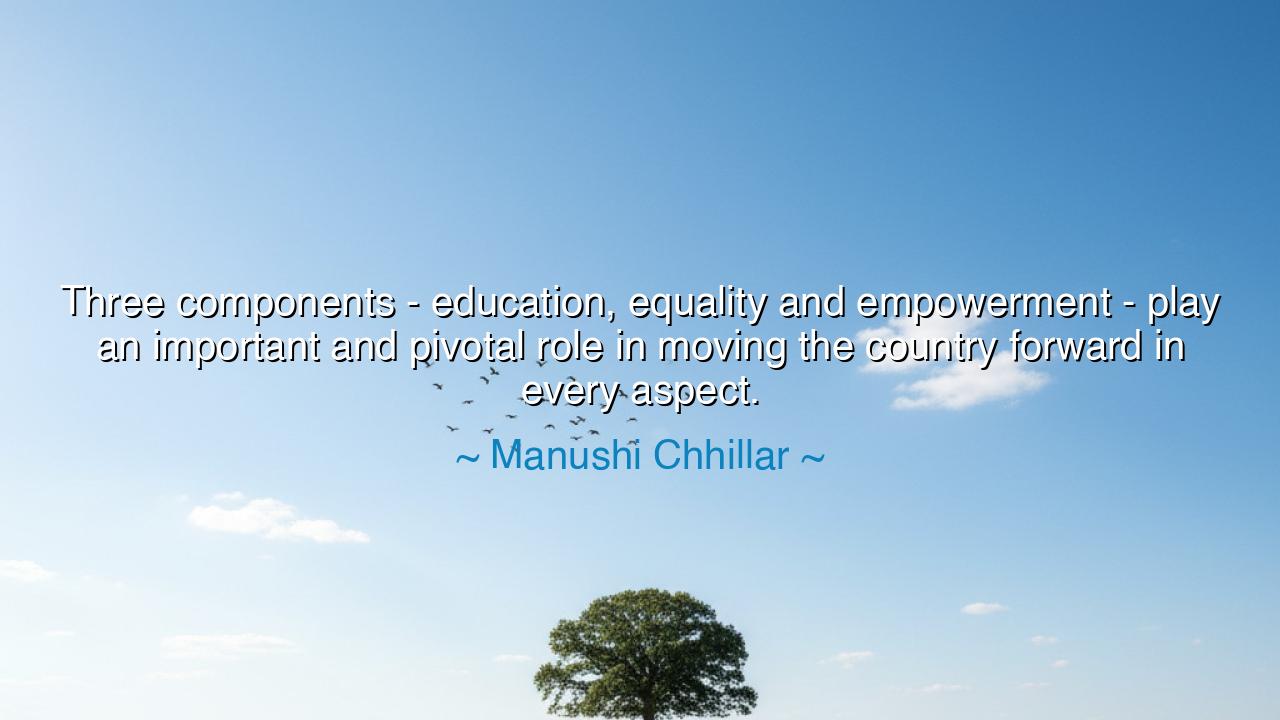
Three components - education, equality and empowerment - play an
Three components - education, equality and empowerment - play an important and pivotal role in moving the country forward in every aspect.






The words of Manushi Chhillar, Miss World 2017 and advocate for women’s education and dignity, carry the strength of both youth and wisdom: “Three components—education, equality and empowerment—play an important and pivotal role in moving the country forward in every aspect.” Though spoken in the modern age, these words echo the timeless principles that have shaped every flourishing civilization. In her insight, Chhillar reminds us that progress is not built upon wealth alone, nor upon power or conquest, but upon the development of the human spirit—its knowledge, its justice, and its freedom. These three—education, equality, and empowerment—are not separate paths, but three pillars of one great foundation: the liberation of humanity itself.
To understand the origin of her words, we must look beyond the glittering stage from which they were spoken and into the heart of her mission. Manushi Chhillar, a medical student from India who rose to international prominence, chose to use her voice not for fame but for purpose. She has spoken often of the power of education and dignity, especially for women, as the true catalysts for national progress. Her statement came as part of her reflections on development—an understanding born from both her studies in medicine and her advocacy for menstrual health and equal opportunity. Her wisdom, though expressed with youthful grace, springs from an ancient truth: that a nation is not measured by its wealth, but by how it uplifts its people. To educate, to equalize, to empower—these are not luxuries of civilization, but its lifeblood.
The first pillar she names—education—is the seed of all transformation. Without knowledge, the human being is like a lamp unlit, its oil wasted, its purpose forgotten. Education does more than instruct; it awakens. It turns fear into understanding, ignorance into wisdom, and dependence into strength. The ancients knew this well. In the schools of Athens, philosophers taught that the free citizen must be educated not only in letters, but in virtue; for without understanding, freedom becomes folly. So too did India’s own Swami Vivekananda declare that “education is the manifestation of perfection already in man.” Manushi Chhillar’s words carry this same torch: that the true power of a nation lies not in its armies or its treasures, but in the illumination of its people’s minds.
The second pillar—equality—is the moral foundation without which education and progress are hollow. To teach knowledge without teaching justice is to raise the wise oppressor; to build wealth without fairness is to sow resentment and ruin. Equality is not sameness, but the recognition of shared worth—the divine truth that every human soul bears the same light, though it may shine in different colors. History has shown us the power of equality in motion. When Mahatma Gandhi fought for India’s freedom, he did not rally armies but awakened conscience; he taught that no empire could stand forever upon the neck of the unequal. Likewise, when Nelson Mandela emerged from his long imprisonment, he did not call for vengeance but for balance—for a South Africa renewed by justice. As Manushi reminds us, equality is not an end—it is the soil from which peace and prosperity grow.
And yet, knowledge and equality alone are not enough. The third pillar, empowerment, is the spark that turns potential into power. For what use is education if one cannot act upon it? What meaning has equality if one fears to speak or stand tall? Empowerment is the courage to claim one’s voice, to participate in shaping destiny. When women are empowered, families thrive; when youth are empowered, nations awaken. The story of Malala Yousafzai stands as a modern testament to this truth. A young girl who refused to surrender her right to learn, she endured violence and rose stronger, transforming her suffering into a global movement for education. Her life mirrors Chhillar’s message: that the true revolution is not fought with weapons, but with knowledge, dignity, and courage.
Together, these three—education, equality, empowerment—form the triad of human advancement. Without one, the other two falter. Education without equality breeds elitism. Equality without empowerment breeds stagnation. Empowerment without education leads to chaos. But when they unite, they create harmony—an upward motion that lifts not just individuals but entire civilizations. The great reformers and visionaries of history understood this harmony instinctively. Rabindranath Tagore dreamed of an India “where the mind is without fear and the head is held high,” and his vision remains unfinished until these three pillars are strong in every home, every heart, and every village.
The lesson of Manushi Chhillar’s words is clear and enduring: to move a nation forward, we must first lift its people. If we would see our societies prosper, we must teach—not merely information, but empathy and creativity. We must guard equality, ensuring that every person, regardless of gender or class, stands upon the same ground of opportunity. And we must kindle empowerment, nurturing the confidence to act, to speak, and to lead. For every educated mind becomes a builder; every empowered soul becomes a light; and every equal heart becomes a thread in the tapestry of peace.
Let her wisdom, then, be passed down like sacred instruction: Educate the mind, honor the equal, and empower the spirit. For no nation can rise that forgets its weakest, and no civilization can endure that silences half its people. Each act of teaching, each moment of fairness, each spark of courage contributes to the eternal work of progress. And when education opens the mind, equality opens the heart, and empowerment lifts the hand—then, and only then, does humanity step forward together into the dawn of true greatness.






AAdministratorAdministrator
Welcome, honored guests. Please leave a comment, we will respond soon